
Berlin is the capital and largest city of Germany, by both area and population. With 3.66 million inhabitants, it has the highest population within its city limits of any city in the European Union. The city is also one of the states of Germany, being the third smallest state in the country by area. Berlin is surrounded by the state of Brandenburg, and Brandenburg's capital Potsdam is nearby. The urban area of Berlin has a population of over 4.6 million and is therefore the most populous urban area in Germany. The Berlin-Brandenburg capital region has around 6.2 million inhabitants and is Germany's second-largest metropolitan region after the Rhine-Ruhr region, and the fifth-biggest metropolitan region by GDP in the European Union.

Bavaria, officially the Free State of Bavaria, is a state in the southeast of Germany. With an area of 70,550.19 km2 (27,239.58 sq mi), it is the largest German state by land area, comprising approximately 1/5 of the total land area of Germany, and with over 13.08 million inhabitants, it is the second most populous German state, behind only North Rhine-Westphalia; however, due to its large land area, its population density is below the German average. Major cities include Munich, Nuremberg, and Augsburg.

Germany, officially the Federal Republic of Germany, is a country in Central Europe. It lies between the Baltic and North Sea to the north and the Alps to the south. Its sixteen constituent states have a total population of over 82 million in an area of 357,596 km2 (138,069 sq mi), making it the most populous member state of the European Union. It borders Denmark to the north, Poland and the Czech Republic to the east, Austria and Switzerland to the south, and France, Luxembourg, Belgium, and the Netherlands to the west. The nation's capital and most populous city is Berlin and its main financial centre is Frankfurt; the largest urban area is the Ruhr.

German is a West Germanic language in the Indo-European language family, mainly spoken in Western and Central Europe. It is the most spoken native language within the European Union. It is the most widely spoken and official language in Germany, Austria, Switzerland, Liechtenstein, and the Italian autonomous province of South Tyrol. It is also an official language of Luxembourg, Belgium and the Italian autonomous region of Friuli-Venezia Giulia, as well as a recognized national language in Namibia. There are also notable German-speaking communities in France (Alsace), the Czech Republic, Poland, Slovakia, Denmark, Romania and Hungary (Sopron). Overseas, sizeable communities of German-speakers are found in Brazil, South Africa (Kroondal), Namibia, among others, some communities have decidedly Austrian German or Swiss German characters.

The German Empire, also referred to as Imperial Germany, the Second Reich or simply Germany, was the period of the German Reich from the unification of Germany in 1871 until the November Revolution in 1918, when the German Reich changed its form of government from a monarchy to a republic.

East Germany, officially known as the German Democratic Republic, was a country in Central Europe from its formation on 7 October 1949 until its reunification with West Germany (FRG) on 3 October 1990. Until 1989, it was generally viewed as a communist state and described itself as a socialist "workers' and peasants' state". The economy of the country was centrally planned and state-owned. Although the GDR had to pay substantial war reparations to the Soviets, its economy became the most successful in the Eastern Bloc.

The Holy Roman Empire, also known as the Holy Roman Empire of the German Nation after 1512, was a polity in Central and Western Europe, usually headed by the Holy Roman Emperor. It developed in the Early Middle Ages, and lasted for a millennium until its dissolution in 1806 during the Napoleonic Wars.

Nazi Germany, officially known as the German Reich and later the Greater German Reich, was the German state between 1933 and 1945, when Adolf Hitler and the Nazi Party controlled the country, transforming it into a totalitarian dictatorship. The Third Reich, meaning "Third Realm" or "Third Empire", referred to the Nazi claim that Nazi Germany was the successor to the earlier Holy Roman Empire (800/962–1806) and German Empire (1871–1918). The Third Reich, which the Nazis referred to as the Thousand-Year Reich, ended in May 1945, after only 12 years, when the Allies defeated Germany and entered the capital, Berlin, ending World War II in Europe.

The Nazi Party, officially the National Socialist German Workers' Party, was a far-right political party in Germany active between 1920 and 1945 that created and supported the ideology of Nazism. Its precursor, the German Workers' Party, existed from 1919 to 1920. The Nazi Party emerged from the extremist German nationalist, racist, and populist Freikorps paramilitary culture, which fought against communist uprisings in post–World War I Germany. The party was created to draw workers away from communism and into völkisch nationalism. Initially, Nazi political strategy focused on anti-big business, anti-bourgeoisie, and anti-capitalism, using disingenuous socialist rhetoric to gain the support of the lower middle class; it was later downplayed to gain the support of business leaders. By the 1930s, the party's main focus shifted to antisemitic and anti-Marxist themes. The party had little popular support until the Great Depression, when worsening living standards and widespread unemployment drove Germans into political extremism.
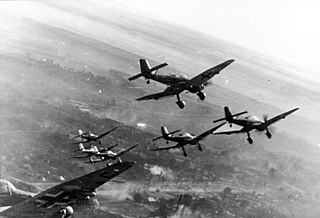
World War II or the Second World War was a global conflict between two coalitions: the Allies and the Axis powers. Nearly all of the world's countries participated, with many nations mobilising all resources in pursuit of total war. Tanks and aircraft played major roles, enabling the strategic bombing of cities and delivery of the first and only nuclear weapons ever used in war. World War II was the deadliest conflict in history, resulting in 70 to 85 million deaths, more than half of which were civilians. Millions died in genocides, including the Holocaust, and by massacres, starvation, and disease. After the Allied victory, Germany, Austria, Japan, and Korea were occupied, and German and Japanese leaders were tried for war crimes.

West Germany is the common English name for the Federal Republic of Germany from its formation on 23 May 1949 until its reunification with East Germany on 3 October 1990. It is sometimes known as the Bonn Republic after its capital city of Bonn. During the Cold War, the western portion of Germany and the associated territory of West Berlin were parts of the Western Bloc. West Germany was formed as a political entity during the Allied occupation of Germany after World War II, established from 12 states formed in the three Allied zones of occupation held by the United States, the United Kingdom, and France.

The Weimar Republic, officially known as the German Reich, was a historical period of Germany from 9 November 1918 to 23 March 1933, during which it was a constitutional republic for the first time in history; hence it is also referred to, and unofficially proclaimed itself, as the German Republic. The period's informal name is derived from the city of Weimar, which hosted the constituent assembly that established its government. In English, the republic was usually simply called "Germany", with "Weimar Republic" not commonly used until the 1930s. The Weimar Republic had a semi-presidential system.

Wilhelm II was the last German Emperor and King of Prussia from 1888 until his abdication in 1918, which marked the end of the German Empire as well as the Hohenzollern dynasty's 300-year rule of Prussia.

The Reichstag fire was an arson attack on the Reichstag building, home of the German parliament in Berlin, on Monday, 27 February 1933, precisely four weeks after Adolf Hitler was sworn in as Chancellor of Germany. Marinus van der Lubbe, a Dutch council communist, was the culprit; the Nazis attributed the fire to a group of Communist agitators, used it as a pretext to claim that Communists were plotting against the German government, and induced President Paul von Hindenburg to issue the Reichstag Fire Decree suspending civil liberties, and pursue a "ruthless confrontation" with the Communists. This made the fire pivotal in the establishment of Nazi Germany.
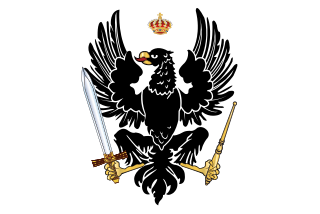
Prussia was a German state centred on the North European Plain that originated from the 1525 secularization of the Prussian part of the State of the Teutonic Order. The Knights had to relocate their headquarters to Mergentheim, but managed to keep land in Livonia until 1561.

Adolf Hitler was an Austrian-born German politician who was the dictator of Nazi Germany from 1933 until his suicide in 1945. He rose to power as the leader of the Nazi Party, becoming the chancellor in 1933 and then taking the title of Führer und Reichskanzler in 1934. His invasion of Poland on 1 September 1939 marked the start of the Second World War. He was closely involved in military operations throughout the war and was central to the perpetration of the Holocaust: the genocide of about six million Jews and millions of other victims.
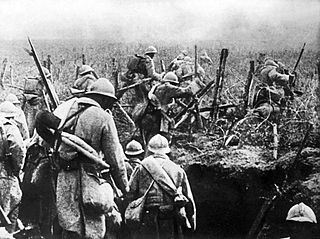
World War I or the First World War, also known as the Great War, was a global conflict between two coalitions: the Allies and the Central Powers. Fighting took place mainly in Europe and the Middle East, as well as in parts of Africa and the Asia-Pacific, and in Europe was characterised by trench warfare; the widespread use of artillery, machine guns, and chemical weapons (gas); and the introductions of tanks and aircraft. World War I was one of the deadliest conflicts in history, resulting in an estimated 10 million military dead and more than 20 million wounded, plus some 10 million civilian dead from causes including genocide. The movement of large numbers of people was a major factor in the deadly Spanish flu pandemic.

Austria, formally the Republic of Austria, is a landlocked country in Central Europe, lying in the Eastern Alps. It is a federation of nine states, of which the capital Vienna is the most populous city and state. Austria is bordered by Germany to the northwest, the Czech Republic to the north, Slovakia to the northeast, Hungary to the east, Slovenia and Italy to the south, and Switzerland and Liechtenstein to the west. The country occupies an area of 83,879 km2 (32,386 sq mi) and has a population of around 9 million.
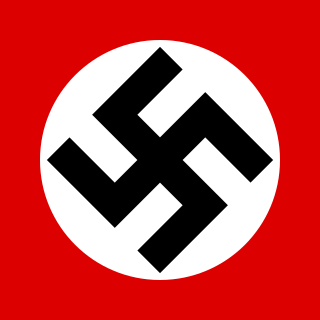
Nazism, formally named National Socialism, is the far-right totalitarian socio-political ideology and practices associated with Adolf Hitler and the Nazi Party (NSDAP) in Germany. During Hitler's rise to power in 1930s Europe, it was frequently referred to as Hitler Fascism and Hitlerism. The later related term "neo-Nazism" is applied to other far-right groups with similar ideas which formed after the Second World War and therefore after the Third Reich collapsed.
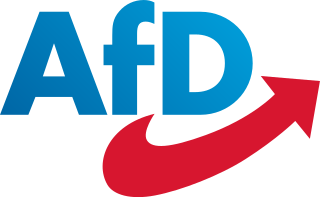
Alternative for Germany is a far-right and right-wing populist political party in Germany. The AfD is Eurosceptic, and opposes immigration into Germany, especially Muslim immigration. The name of the party reflects its resistance to policies of Angela Merkel with her insistence on Alternativlosigkeit. The Federal Office for the Protection of the Constitution, Germany's domestic intelligence agency, has classified the party as a "suspected extremist" organisation.























